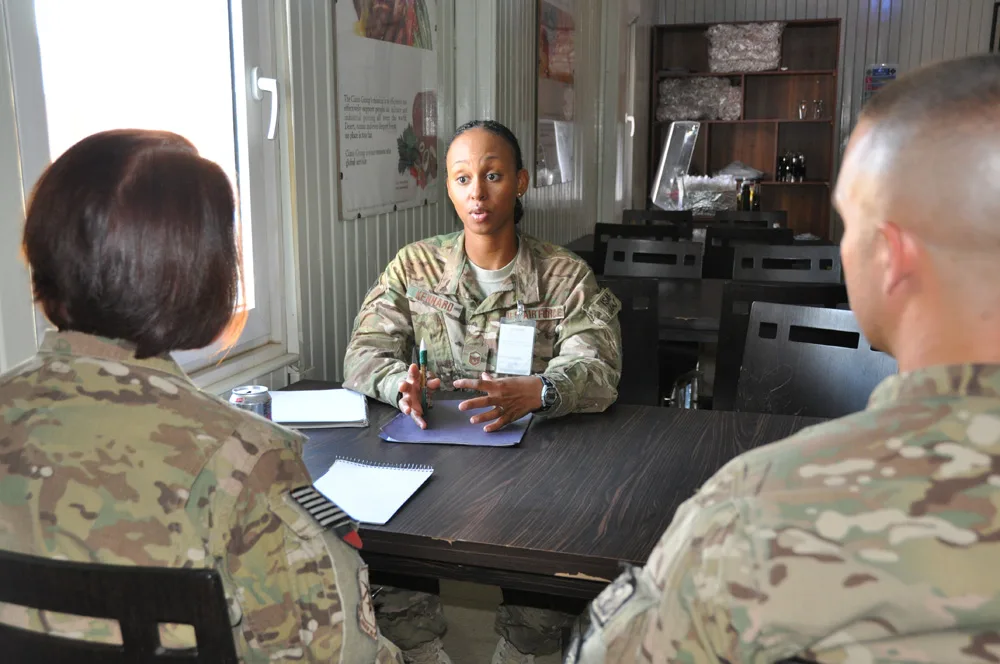If you’re a military service member who’s experienced sexual assault, you may feel betrayed, isolated and even helpless. But you do have rights and protections under military policy, as well as avenues for reporting your assault and seeking justice and restitution. Understanding those rights and knowing how to connect with the people tasked with helping you navigate the systems for reporting, pursuing prosecution, and accessing medical care and recovery resources can help you make the decisions that are right for you and your future health and recovery.
If you’ve been assaulted, or know someone who has, here’s what you need to know about the resources available in the military and beyond:
- Reporting
Whether you’re deployed across the world or at your home station, there’s a Sexual Assault Response Coordinator (SARC) who’s on call and available to you. The Defense Department’s Safe Helpline website allows you to search for your local SARC’s phone number by military base or service branch. It can also connect you with military police, civilian sexual assault service providers, chaplains, medical personnel and legal services. When you report an assault, you’ll have the option of making a restricted report, which is anonymous and will not notify your command or law enforcement. An unrestricted report is not anonymous and will prompt a command investigation into the crime. You can change a restricted report to unrestricted at any time. DoD’s Sexual Assault Prevention and Response office provides more information on reporting options and available services.
- Seeking help
Military chaplains can provide confidential counseling and support even if you’re not yet ready to report your assault. Specially appointed military lawyers, known as Special Victims’ Counsel or Victims’ Legal Counsel depending on your service, are also available to meet with you confidentially and explain legal processes and protections whether or not you’ve reported. If you pursue an investigation and prosecution, these lawyers will also assist you throughout the process. Support isn’t limited to what the military offers, though: Advocates encourage survivors to reach out to veterans service organizations such as Iraq and Afghanistan Veterans of America and Disabled American Veterans for additional resources and advocacy.
- Speaking out
Nobody can prevent you from talking about your assault, and retaliation is illegal. Advocates say family members can be powerful allies for service members, particularly if the legal and reporting process is not working the way it should. You also have the option of reaching out to your Congress members for advocacy or intervention. These communications are protected by law from retaliation of any kind.
- Knowing your rights
If you’ve reported a sexual assault, retaliation of any sort by your command or fellow service members is illegal and can be reported to your local SARC or the DoD Safe Helpline. You also have the right to request an expedited transfer to another installation if you feel unsafe or excluded in the wake of your assault. A July 2023 executive order signed by President Joe Biden took the responsibility of prosecuting the crime out of the victim’s chain of command. This provides an additional layer of protection from retaliation and undue influence. Victims also have the right to be treated with dignity and privacy, to be protected from their assailant, to attend all public legal proceedings and to ask for available restitution.
- Recovering mentally and physically
While the military health system offers resources and care that your SARC can help you access, know that you have access to far more than what the military provides. Independent programs like The Road Home out of Rush University Medical Center specialize in providing intensive and knowledgeable care to military sexual trauma (MST) survivors. Your military-provided TRICARE health insurance can also be used at many civilian-run inpatient programs and mental health care providers. If you need help finding a program or provider that’s right for you, consider contacting the Service Women’s Action Network or Protect Our Defenders, which specialize in meeting the needs of MST survivors.
Resources
DoD’s Sexual Assault Prevention and Response Office
The Service Women’s Action Network Guide for MST Survivors
Iraq and Afghanistan Veterans of America
The Department of Veterans Affairs MST Services
This educational resource was created with support from the Ready, Healthy & Able program funders.
The appearance of U.S. Department of Defense (DoD) visual information does not imply or constitute DoD endorsement.















